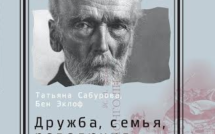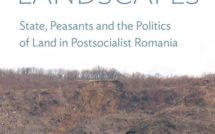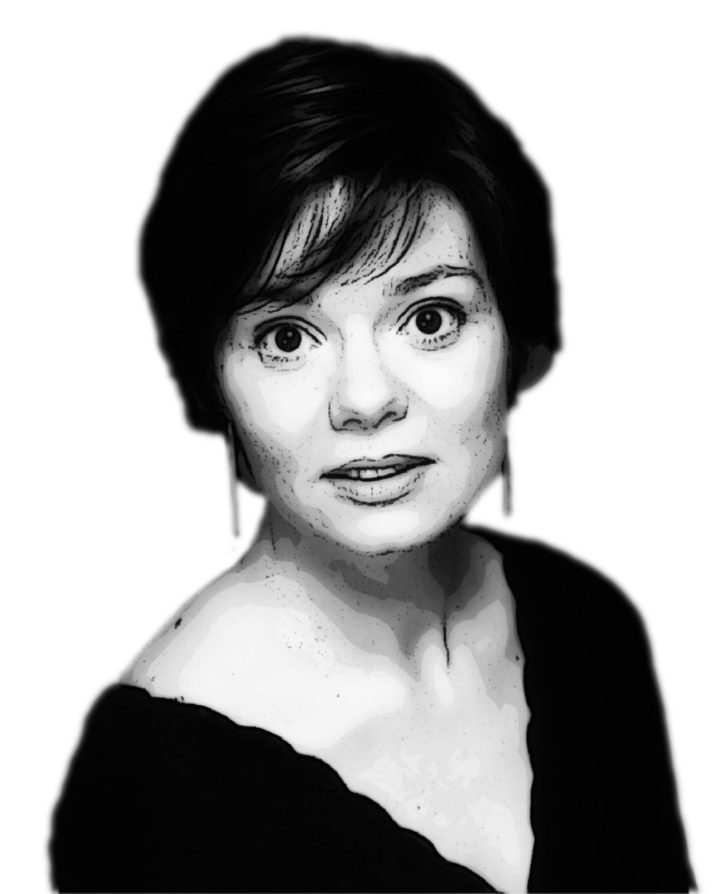
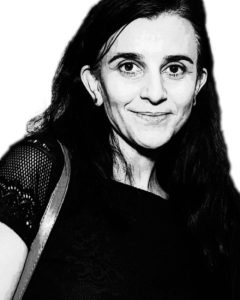
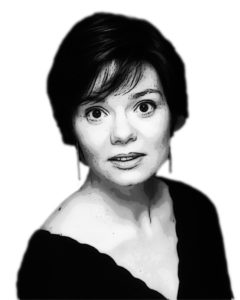
This is part of our special feature, Diversity, Security, Mobility: Challenges for Eastern Europe.
On Wednesday November 15, 2017, the Council for European Studies in conjunction with Bulgarian Concert Evenings in New York (BCENY), and the Elizabeth Kostova Foundation (EKF) hosted EuropeNow Spotlights Bulgaria: A Night of Music, Readings & Art—a multidisciplinary event at the Bulgarian Consulate in New York, celebrating Bulgarian literature, music, and visual art, as well as the first anniversary of EuropeNow’s publication.
One day later, on November 16, the submission period opened for applications to the Council for European Studies’ newest grant—the New Artists Award. Interdisciplinary, and artistically focused, the New Artists Award is CES’ first award solely dedicated to the arts. Created in collaboration with BCENY, and the EKF, the award’s inaugural cycle focuses on supporting emerging Bulgarian artists, and giving their work well-deserved attention.
I spoke with Lora Tchekoratova and Milena Deleva (who direct and run the BCENY, and the EKF, respectively) for over an hour, discussing how the road to creating this event curved organically into the creation of this grant. It was inspiring and informative, and I have come away with a greater appreciation for cultural centers—concrete as well as abstract—and more importantly, the people who create them.
—Lillian Klein for EuropeNow
EuropeNow Please tell us a little about yourselves.
Lora Tchekoratova I am a Bulgarian pianist and I have lived in New York since the early 90s when I came to study at Julliard. At that time—right after the fall of the Berlin Wall—many Bulgarians started traveling freely, and a lot of us young musicians chose to study abroad. But many of us still felt deeply connected to Bulgaria, so we started the Bulgarian Concert Evening in New York. The series holds about 10 concerts per year—all free.
The American Foundation for Bulgaria expressed interested in our project so we have an established relationship with them as well. Three years ago, we celebrated our tenth anniversary, and we decided to hold an event to support the concert series. That’s actually where I met Milena. She donated books.
EuropeNow That’s wonderful you’ve been able to form the concert evenings into such a success.
What about you, Milena, and your organization?
Milena Deleva Of course. I am the director of the Elizabeth Kostova Foundation. I have worked there since it originated in 2007.
EuropeNow What are the EKF’s main goals?
Milena Deleva Elizabeth Kostova and her cofounder Svetlozar Zhelev, who is a publisher and literary scout, created the Sozopol Fiction Seminars, initially intended for fiction writers, working in Bulgarian as well as English. The annual seminar brings together writers from the English speaking world, Bulgarian writers, publishers, editors—there is valuable exchange on so many different levels. It was and is very exciting.
However I soon realized, that. if we wanted Bulgarian work to be more widely read, and wanted to bring more literature into Bulgaria, we would have to create and train translators and support and them and the field.
Currently we have the annual Krastan Dyankov Translation Award named after one of the most famous Bulgarian translators of American literature. And the Literary Translators’ Residency, an annual award and residency program for the translation of Bulgarian novels into the English that we currently co-run with Open Letter Books.
So the EKF has two major programs, the first being, to support Bulgarian writers, the second being to support Bulgarian translators, and these goals are intertwined.
I came to New York and started with the foundation at an opportune moment. The National Endowment for the Arts had just widely publicized the 3 percent issue, which stated that only 3% of the books published in the United States are books in translation. Of that 3 percent, less that 1 percent was fiction.
EuropeNow Have those numbers improved?
Milena Deleva Things are improving. Publishers of international literature have established themselves a bit more since then, they are more recognized, they publish more books, and they get more funding from the NEA and so on and so forth. And different types of publishers are interested in international literature—non-profits based in universities like Open Letter Books, as well as publishers like Europa Editions. So the field and market has grown.
EuropeNow So how did you, and your organizations come to work together?
Lora Tchekoratova We knew each other and had collaborated on projects before, but this project, and the grant that was created, started with planning the event held on November 15. The goal was to create an interdisciplinary experience—to bring together different artists to preform alongside one another in the same evening. We were working with Ted Vassilev from the American Foundation for Bulgaria as well, and he suggested that this interdisciplinary event could or should, be the basis for a similarly collaborative grant. He very much wanted to figure out a way to make that possible.
Then an old classmate from Julliard told me about EuropeNow. I met Nicole Shea and she was very interested in working together. We reached out to try and bring Milena and the American foundation onboard and see what we could do in terms of a grant.
Milena Deleva Creating this grant, like the entirety of this collaboration, was such a natural occurrence, in part I think because looking at the (American) programming that Bulgarian Concert Evenings and Elizabeth Kostova Foundation have, it’s like mirroring efforts in music and literature. For this event specifically we wanted to include visual artists as well. And it so happens—probably because they don’t have their own umbrella organization, and because there are already these two, established, organized efforts in music and literature—many visual artists are involved in our organizations, our circles.
Lora Tchekoratova To mention one of the visual artists, an interdisciplinary collaboration on her own, Ani Collier’s work was on display. Ani came to the U.S. as a ballet dancer and when she retired, to remain connected to dance, she became a dance photographer. She is also very interested in city architecture and life in cities , so from there she started making these amazing collages—various New York City buildings. But her work maintains a sense of dance and movement, it’s really quite spectacular.
EuropeNow So both of your organizations recently collaborated with CES to create a new interdisciplinary award for emerging Bulgarian artists—the New Artists Award—why is this something you both feel is important? Is there a specific hole in the support system that it patches?
Milena Deleva There is some government funding is there, but it’s limited.
Lora Tchekoratova Everybody knows there is not enough funding for the arts anywhere, but particularly in Eastern Europe. There the situation is very dire. Many artists, particularly musicians, are trying to find funding for their work. It is certainly not comparable to other European countries whose governments’ make it a point to fund the arts, nor is it comparable to New York. In Bulgaria, this kind of general philanthropy does not exist in the same way. Because there is not a system of non-profit support, very little funding for the arts is generated privately. Living in a place like New York, increases the opportunities for funding, but there are a number of artists who do not want to leave Bulgaria, who want to stay and create there. That was the idea—to find a way to support creativity of Bulgarians anywhere. We hope to prompt the creation of new work, and the inclusion of multiple artists. Like Milena mentioned, we wanted to create a situation where layers of exchange can take place—it reflects our collaborative work in creating this award, and hopefully encourages others into similarly collaborative situations. Eventually the plan is to expand and collaborate with other Eastern European countries—or whomever—but in it’s inaugural cycle, we have the facilities to target creative minds in Bulgaria, so we started there.
EuropeNow Why is collaboration of this sort such an important aspect to this event? To the arts?
Lora Tchekoratova For one thing, when working with another organization or organizations, there can be much more flexibility in programming. From the coordination point of view, there is a sense that people want to have an experience beyond—for instance—going to a classical concert. People are more open and can connect strongly to an event that is collaborative, and interdisciplinary. And it’s understandable, we welcome that people connect over different things. Interdisciplinary events and collaboration create community in a larger way.
Milena Deleva In my experience collaboration always pays back, and in many different ways. It pays back for the organizations, but also for the audience because it’s great cross exposure on a number of levels, it connects people inter-generationally, it connects Americans and Bulgarians, it connects emerging and established artists, and it also brings together the literary and the non-literary. Creating these connections, ensuring it is a non-specialized environment makes events accessible for more people to participate
At the event for instance, Dobrinka Tabakova’s music was a very good way to bring our audiences together. She is Bulgarian, but she lives in London, and she is very well accomplished and well known. In a way, she is intrinsically a bridge from west to east. She has done great things for Bulgarian music.
We are living in a time when attracting and maintaining an audience is an uphill battle—it’s difficult to keep people interested in your work—especially a non-profit. It has made me appreciate the Bulgarian Consulate very much as a venue because it’s such a communal place—people attend programs there who otherwise might not think, or be enthused to come to a literary reading or classical concert but they will come for the community—the shared culture. It is important to have and continue to create these cultural centers – places where culture and art and language can be effortlessly shared.
Lora Tchekoratova Yes, absolutely. Writers and composers do not only write for other writers and other composers, they write for everybody.
Another exchange was Trifon Silyanovsky (1923-2005). His music was played after Elizabeth Kostova read from The Shadow Lands, which is about a violinist who comes to Bulgaria from Vienna during the war and then is not allowed to leave. We wanted to find a musician composer whose music could thematically speak to that.
Trifon was a genius musician as well as artist and his creativity is apparent in his music. He works through all the different genres and expressive, creative modes. He studied in Vienna and then returned to Bulgaria. One evening as he’s coming out of rehearsal at the philharmonic he makes a silly joke. He points at a portrait of Lenin, Stalin, and Georgi Dimitrov—who, when he was alive, was sort of a Lenin figure in Bulgaria—and pointing at Stalin specifically, and says something like: “Don’t worry, one day he will die too.”
That night he went home. And the next day he is picked up, and they sent to a work-camp. For three years.
He was, eventually released, but he was never allowed to go back to Sofia. He is not allowed to go back to Vienna. So he had to support himself living in smaller towns teaching Greek and Latin. When things relaxed a little bit in the 70s, politically speaking, he went back to music. But he did not reenter his carrer into a position that reflected his talent and level of intellect and genius. It wasn’t until the 90s, after the Berlin Wall came down, that he was appointed a professorship. So his was an interesting, complementary story to Elizabeth’s novel. And his music is quite literary in a way. I think many writers are musical and many composers are literary. There is such a deep, deep connection between all of the arts. You cannot isolate one from the other. So that’s been always fascinating to explore. And I think it was a wonderful pairing at this event.
EuropeNow The event and award—bridges are being built everywhere. Has this collaboration extended beyond this event? Are there intentions to further expand it—beyond the Bulgarian community?
Milena Deleva We hope that next year we will be able to involve another country.
Lora Tchekoratova Yes, absolutely.To do something properly—as best as it can be done—you open it up. The larger idea is to collaborate with others—and make art—whichever kind of art—accessible to people. To create this community, it’s important.
People don’t know so much about what is happening creatively in music in Eastern Europe. So it is good to particularly focus attention there. Even Milena and I are not aware of it. Because, at the moment there isn’t an organized effort to bring Bulgarian composers’ music here, or making it available to people here, nor is the music published in America. They don’t have the exposure. If the music is here—I would say 95% of the time—it was brought deliberately by someone who went back to Bulgaria, went to an old library, made a photocopy, and returned.
It’s a problem because it generates a feeling that there is nothing coming out of Bulgaria in terms of musical composition compared to other countries, and I just don’t believe that is the case. Human creativity, no matter the money or no money, people create – this is what humans are. I’m sure there is a lot. Just our access to it is limited. So we are very curious to see what kind of music will come out from Bulgaria. I hope we discover new voices, and I hope to see how the next generation of composers connects to other art forms, whether visual or literary, or another.
EuropeNow That’s great, I am also curious about what will be discovered—not only people who have won the award but how they create new communities of artists.
Milena Deleva Yes, definitely. I’m looking forwards to intrinsic collaboration. No matter which of the three eligible art forms will come together be it music and literature or visual arts and music or the three of them it’s important to uncover these intrinsic connections between artistic forms. Because they are there.
Milena Deleva graduated in cultural studies from Sofia University and has done research on cultural policy in the Netherlands. She is a co-author of Cultural Policy, Politics and Change (Amsterdam: Boekmanstichting, 2005) and the author of Technological Park Culture (Bucharest: Ecumest, 2005). She is a guest lecturer at the Cultural Policy Program of Plovdiv University and taught at the Cultural Studies Department of Sofia University for a semester. From 2005 to 2007, she ran the literature series at the Red House Center for Culture and Debate. She has also worked for the European Cultural Foundation of Amsterdam and was coordinator of the literature program of the Soros Center for the Arts in Sofia from 1998 to 2002. She has held several fellowships in the field of arts management, including ArtsLink, New York, and AMSU, Amsterdam.
Lora Tchekoratova Bulgarian pianist Lora Tchekoratova has appeared as soloist, recitalist, and chamber musician throughout the United States and Europe. At age 21 she won first prize at the Washington International Competition for pianists, where she was also awarded the audience prize, and the prize for the youngest finalist. At The Juilliard School in New York City, she received her Bachelor’s, Master’s, and Doctor of Musical Arts degrees as a student of Seymour Lipkin. Currently, she is co-chair of the Executive Board of Bulgarian Concert Evenings in New York, a concert series, dedicated to the presentation of music and musicians from Bulgaria. The Lower Manhattan Cultural Fund, the Puffin Foundation, the Arthur Foundation and the Kittredge Fund have all awarded her grants for the presentation of lesser-known music from her country.
Lillian Klein is the programs coordinator at the Council for European Studies. She holds a B.A. in literature with a minor in religious studies from Barnard College, as well as an M.F.A. in fiction from Columbia University. Previously, Lillian assisted in the Memberships, Programs, and Awards Department at PEN America Center. She also served as a teaching fellow at Paris American Academy’s writing program for two consecutive summers.
Published on December 6, 2017.

